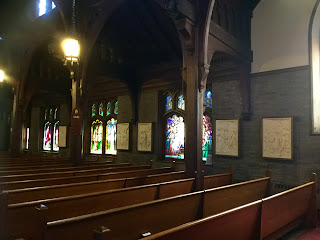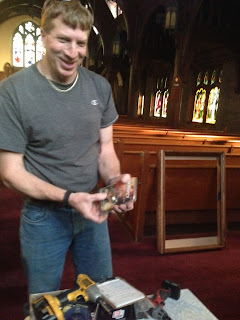This week, our Stations of the Cross really came home (for more Q and A about them and where they came from and why, see this from January. For pictures from St John’s Bowdoin Street and the installation at Christ Church, see my own blog, SaraIwrites.
They are striking and surprising and brand new and at the same time look like they’ve been there since the church was built. They are, in fact, from the same time period—they’re dated 1888, but the woodwork that David Moseley created for them matches the church in a completely phenomenal way. (David is a longtime friend of Christ Church—he did the repair work in our new combined outreach space for Diaper Depot/Grandma’s Pantry and is married to Cathy Hughes’ older daughter Betsy). As happens so often, the thing that surprised was not the thing that I thought would be remarkable. I expected to react more strongly to the overall sight of them, but that’s not the most interesting thing.
This week I was here for Tuesday evening formation and had my kids along. For whatever reason, the only other person who came was Andrea, so we chatted for a while but by 7:30 figured no one else was planning to come. I told my kids to pack up their stuff, we were leaving, but 6 ½ year old Adah declared that she was not ready to leave church. I asked her if it was because she wanted to have communion and she said no, she just thought we should have church. So Adah and Andrea and I decided to do the liturgy for Stations of the Cross. (Older brother Isaiah decided to hang out for a while and play video games for a few minutes, but ended up joining us later).
So, so often, my children make me see things I wouldn’t otherwise, and that’s what happened that night. After having been dragged along during the installation of the frames for two hours on Sunday, they had already spent a lot of time with the pieces and they were over it. “Art,” Adah had declared on our way to Waltham that afternoon, “is boring.” I don’t know what it was that made her not ready to leave, but as we stayed and went around the church, I heard the words of the liturgy in a different way. By the time we got to the station where Jesus meets his mother, Adah was beginning to regret her desire to stay. At that moment, though, I became profoundly grateful to be there with them. To look at Jesus trying to hold both his cross and take his mother’s arm while my own kids bounced around, I imagined her thinking of the days when Jesus was small. I thought about her wanting to protect him and being unable to. The line “A sword will pierce your own soul, too” in the prayers made me think about how much all of those we love face, and how we can’t protect them. We can only trust God for them and on their behalf.
The thing about our particular stations of the cross that continues to show me new things is how they offer a wider lens on the events of the Passion. You can see the two criminals along side of whom Jesus was killed. You can see the detail of Jesus and his mother and all the people around them. There are people everywhere all around in them—how often have you thought about all the people who just were around when Jesus was on his way to the crucifixion? It’s not just him and the Romans and Simon of Cyrene.
The Stations of the Cross do change the dynamic of the space. I suspect it will take us a while to figure out exactly what they mean. I do know that in seeing the events of the Passion displayed as they are, that I also see the events of the Resurrection in a new way. The other thing in the church that is that same light color is the baptismal font. It no longer sits by itself in the corner, but ties in with the movement around the church. Also crucially, the Stations of the Cross circle the space, but the altar is still at the center. That’s the place where we still meet Jesus in the Eucharist. By seeing the crucifixion in a new way, by really seeing it, we see the Resurrection in a new way. They go together.
Again and again, that’s what I’m most grateful for about being a Christian. It’s not some happy pastel fantasy that everything works out in the end and we should just keep our chins up. Jesus weeps and suffers. He loves. He fears. The Stations of the Cross help me see all of those aspects. We are all here because we believe, or want to believe, in resurrection. But we all also know pain. Walking the events of Christ’s passion, we see where God has gone before.
Blessings,
Sara+
Miss the sermon on Sunday, March 13? It’s here.
More pictures from moving the Stations of the Cross from St John's, Bowdoin Street, to Christ Church, Waltham!





















